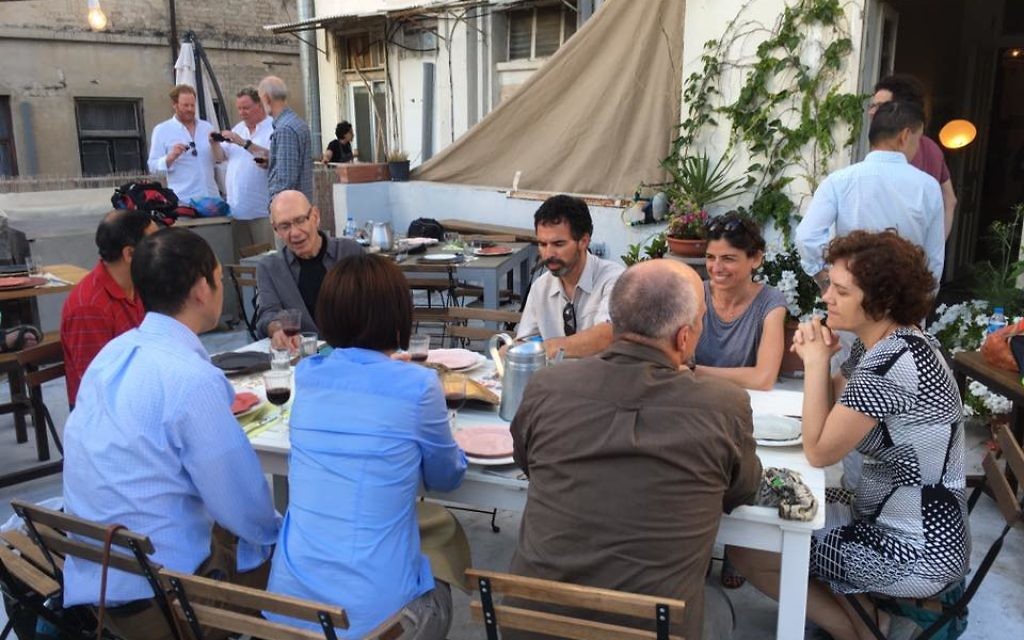Fellowship Connects Professors to Israeli Colleagues
Collaborations are expected to last long after the 12-day trip.
When Zhaohui “Steve” Qin left for Israel at the start of June as one of 26 U.S. university professors participating in the 2017 Faculty Fellowship Summer Institute, “I thought we would just be visiting numerous universities and collaborating with colleagues, but I quickly realized it was much more than that.”

The fellowship, sponsored by Jewish National Fund and Media Watch International and offered to professors across the United States, provided an in-depth look at Israel’s politics, history, economy and culture over 12 days while promoting enduring collaborations within each professor’s field. It’s the opposite of the boycott, divestment and sanctions movement, which seeks to isolate Israeli academics and cut off their ties with foreign peers.
This year’s fellows included Qin, a biostatistics and bioinformatics professor at Emory University; Gary Grossman, a forestry and natural resources professor at the University of Georgia; and Gregory Barz, an ethnomusicologist at Vanderbilt University.
Get The AJT Newsletter by email and never miss our top stories Free Sign Up
The professors met with journalists, Knesset members and politicians as well as peers at hospitals and universities.
Grossman, who had never visited Israel, learned about the fellowship from a JNF email. He had been offered a postdoc opportunity at Tel Aviv University eight years ago but took a tenure-track position at UGA instead. Still, he had kept in contact with Israeli researchers.
“My notions of Israel were mainly conditioned by the U.S. press, which tends to broadcast negative reports about Israel, but I actually learned about all the different things Israel does,” Grossman said about the summer trip.
“The theme of tikkun olam was repeated constantly,” he said.
Grossman recounted a visit to Western Galilee Medical Center, within four miles of Lebanon. He said the hospital treats people wounded in Lebanon or nearby Syria, whether civilians or military, regardless of their affiliation. “I’m a New York Times subscriber, but that’s something I’ve never noticed reported in the paper.”
Grossman looks forward to various collaborations made possible by the fellowship, including teaching at the Arava Institute for Environmental Studies, ecological research and biological teaching at Tel Aviv University, the University of Haifa and the Technion, and a short course in aquatic ecology at Tel-Hai College in the Upper Galilee.
“I felt I had collaborators and joint research opportunities everywhere we went and received a deeper sense of not only the country’s history, but Israelis’ everyday lives,” Barz said. “It was much more important for me to learn about Israel and the birth of the state while being on the ground and learning from a variety of perspectives.”
Barz and a number of colleagues are starting a project focusing on drag queens in Tel Aviv, which he said is an important research topic related to political expression.
“To walk the streets of Jerusalem was profound, emotional and spiritual,” Barz said. “The depth of history you can walk on and breathe in reminds me of the deep political history that supports current politics in Israel. I am thankful for JNF and Media Watch’s deep commitment in fostering each professor’s curiosity and granting us the opportunity to explore Israel on its own terms.”

Although Qin is not Jewish, he studies the Talmud regularly and is fascinated by connections between the Chinese and Jewish cultures, increasing his enthusiasm for the fellowship.
In addition to learning about Israel’s history, he met with an old colleague whose recent research results he hopes to incorporate into his own project.
Qin, who spoke at Tel Aviv University, invited one of the professors there to present a seminar within his department.
“I was very impressed with Israeli technology and its advancement,” said Qin, noting Israel’s initiatives in recycling water. “Israelis are very focused on innovation and stating their opinion, which is different from the Chinese culture I grew up in. Everyone knows Israel as a country of startups, but it also involves critical thinking and development, which plays a much bigger role.”
Grossman said: “You get a sense of history and timelessness of human struggle that you simply don’t get anywhere else while visiting Israel. It is an amazing trip for any faculty member, and I would encourage them to apply regardless of their religious affiliation.”





comments